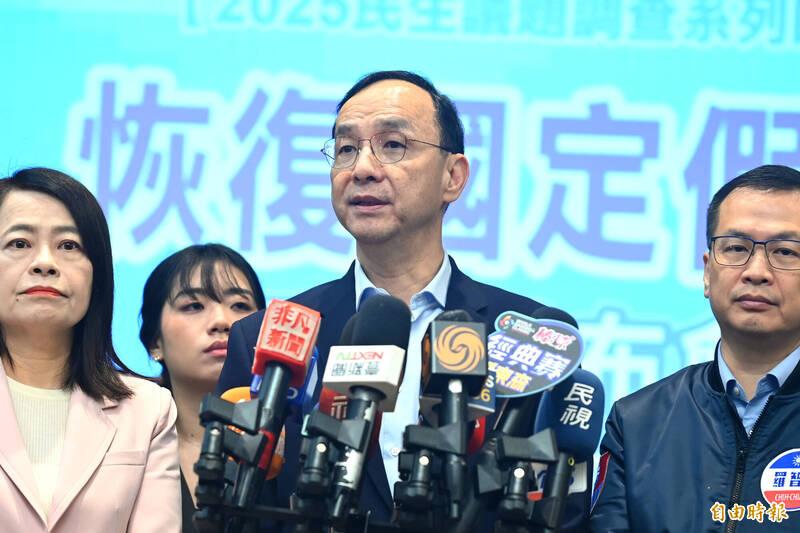The majority of respondents in a survey about Taiwan’s national holidays support reinstating seven former annual holidays, a Chinese Nationalist Party (KMT) think tank today told a news conference.
The KMT commissioned All Dimensions Public Research, Inc. to carry out the survey from Thursday until Saturday last week, collecting 1,068 effective samples with a margin of error of 3 percentage points.

Photo: Wang I-sung, Taipei Times
About 56.7 percent supported reinstating seven more annual holidays, which were removed in 2016, according to the poll.
About 66.3 percent were in favor of designating Labor Day as a public holiday, while 64.3 percent supported reinstating Teachers’ Day as a holiday, 64.1 percent for Retrocession Day on Oct. 25 which commemorates the end of Japanese occupation of Taiwan, and 65.4 percent for Constitution Day on Dec. 25.
The KMT has made restoring public holidays a priority bill in the upcoming legislative session of the Legislative Yuan.
The Legislative Yuan must closely examine the working hours and rest days of Taiwanese workers in this upcoming session, as Taiwan has become a “sweatshop island,” KMT Chairman Eric Chu (朱立倫) said.
Taiwanese workers are known to work hard, with fewer annual rest days than those in Asian neighbors, with 11 national holidays a year compared to 16 in Japan and South Korea, 17 in Hong Kong and 13 in China, he said.
Taiwan’s work hours are also the longest in Asia according to the Organisation for Economic Co-operation and Development (OECD) with the exception of Singapore, though wages between the two cannot compare, he added.
The seven national holidays were removed in 2016 as amendments to the Labor Standards Act (勞動基準法) that year required all workers to have two days off per week, one fixed and one flexible, meaning those seven holidays were cut to enable the change, the think tank said.
However, data from last year shows that Taiwanese work an average of 2,020 hours per year, the fifth-highest of 39 major countries surveyed, and amendments in recent years have not alleviated Taiwan’s chronic overwork problem, it added.
The National Federation of Teachers Unions and cross-party legislators last week also called for the government to designate Labor Day on May 1 and Teachers’ Day on Sept. 28 as official national holidays to align the number of rest days between the public and private sectors.
Premier Cho Jung-tai (卓榮泰) previously said that he hopes to create a nationwide standard for public holidays and find a solution that minimizes social disruption, calling for an open and rational discussion on the matter.

CHANGING LANDSCAPE: Many of the part-time programs for educators were no longer needed, as many teachers obtain a graduate degree before joining the workforce, experts said Taiwanese universities this year canceled 86 programs, Ministry of Education data showed, with educators attributing the closures to the nation’s low birthrate as well as shifting trends. Fifty-three of the shuttered programs were part-time postgraduate degree programs, about 62 percent of the total, the most in the past five years, the data showed. National Taiwan Normal University (NTNU) discontinued the most part-time master’s programs, at 16: chemistry, life science, earth science, physics, fine arts, music, special education, health promotion and health education, educational psychology and counseling, education, design, Chinese as a second language, library and information sciences, mechatronics engineering, history, physical education

DEADLOCK: As the commission is unable to forum a quorum to review license renewal applications, the channel operators are not at fault and can air past their license date The National Communications Commission (NCC) yesterday said that the Public Television Service (PTS) and 36 other television and radio broadcasters could continue airing, despite the commission’s inability to meet a quorum to review their license renewal applications. The licenses of PTS and the other channels are set to expire between this month and June. The National Communications Commission Organization Act (國家通訊傳播委員會組織法) stipulates that the commission must meet the mandated quorum of four to hold a valid meeting. The seven-member commission currently has only three commissioners. “We have informed the channel operators of the progress we have made in reviewing their license renewal applications, and

The High Prosecutors’ Office yesterday withdrew an appeal against the acquittal of a former bank manager 22 years after his death, marking Taiwan’s first instance of prosecutors rendering posthumous justice to a wrongfully convicted defendant. Chu Ching-en (諸慶恩) — formerly a manager at the Taipei branch of BNP Paribas — was in 1999 accused by Weng Mao-chung (翁茂鍾), then-president of Chia Her Industrial Co, of forging a request for a fixed deposit of US$10 million by I-Hwa Industrial Co, a subsidiary of Chia Her, which was used as collateral. Chu was ruled not guilty in the first trial, but was found guilty

Taiwan People’s Party (TPP) Chairman Huang Kuo-chang (黃國昌) yesterday appealed to the authorities to release former Taipei mayor Ko Wen-je (柯文哲) from pretrial detention amid conflicting reports about his health. The TPP at a news conference on Thursday said that Ko should be released to a hospital for treatment, adding that he has blood in his urine and had spells of pain and nausea followed by vomiting over the past three months. Hsieh Yen-yau (謝炎堯), a retired professor of internal medicine and Ko’s former teacher, said that Ko’s symptoms aligned with gallstones, kidney inflammation and potentially dangerous heart conditions. Ko, charged with